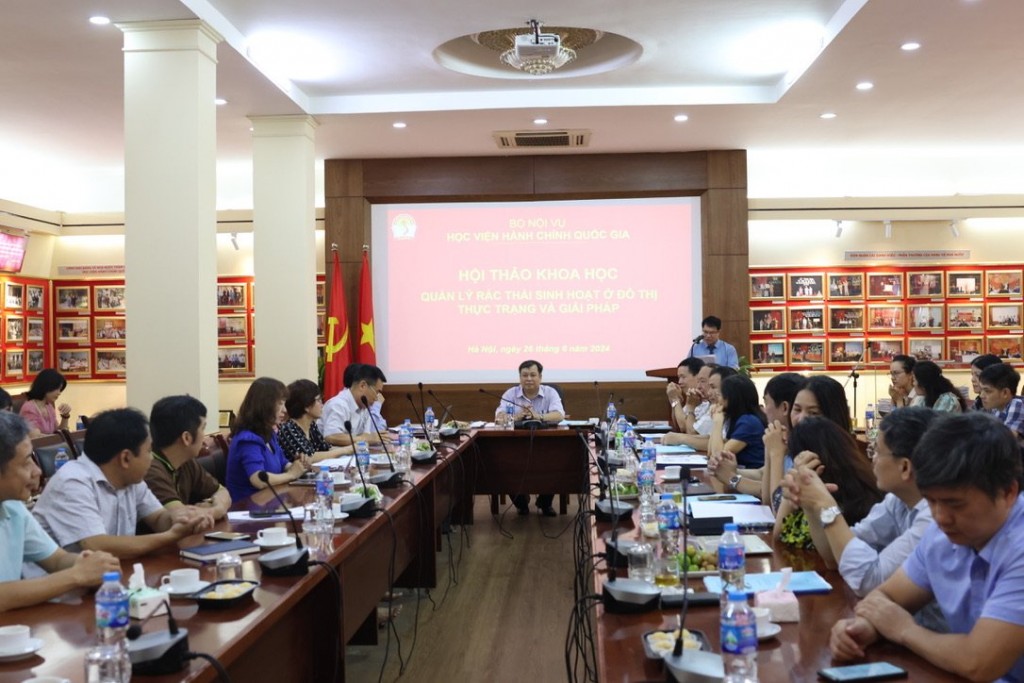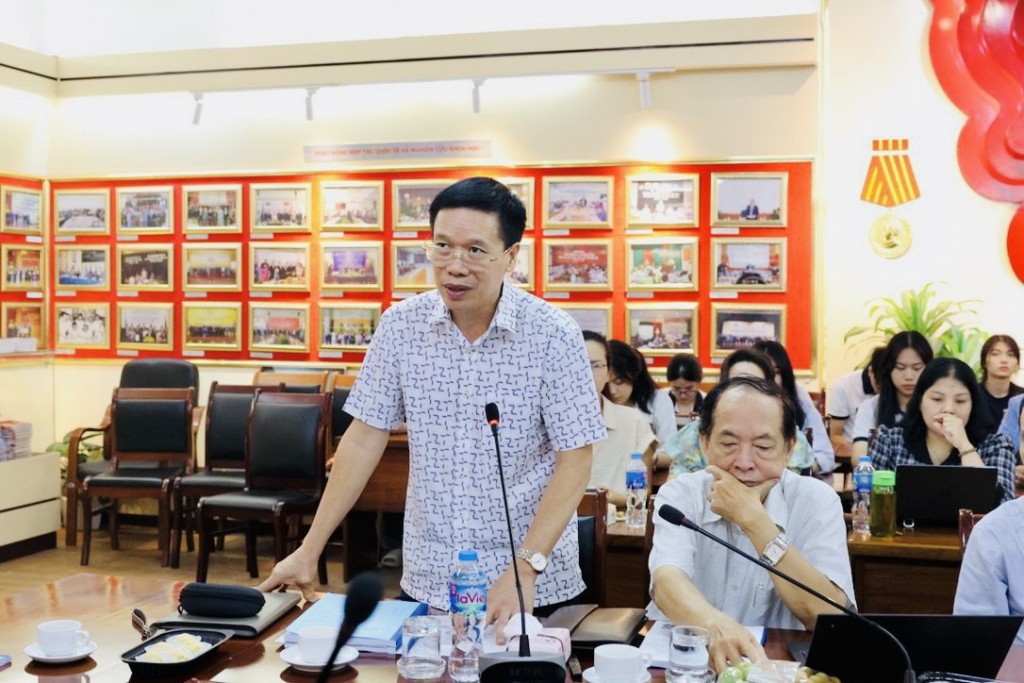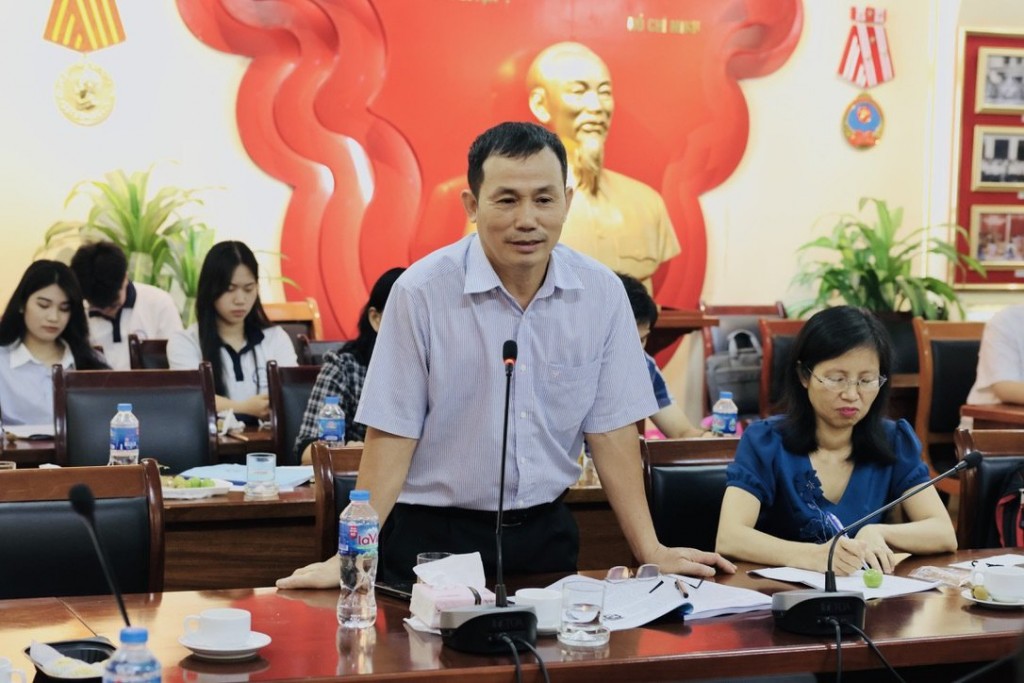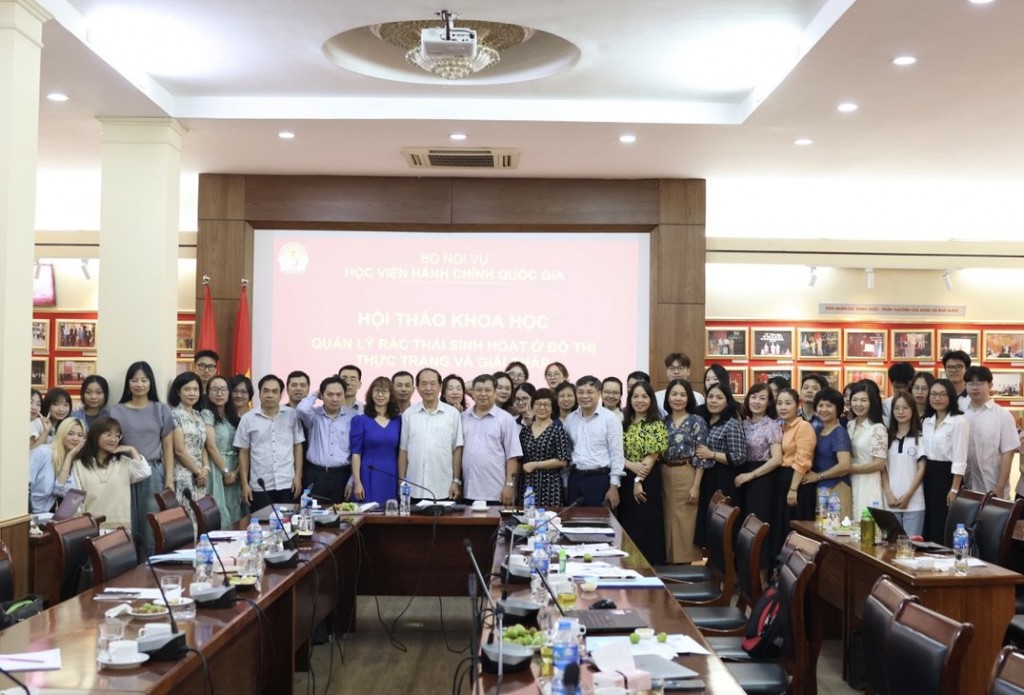On June 26, 2024, at NAPA Headquarters in Ha Noi, the Faculty of Social Management, National Academy of Public Administration (NAPA), held the workshop “Management of Urban Domestic Waste – Current Situation and Solutions.” Assoc. Prof. Dr. Dang Khac Anh, Dean of the Faculty of Social Management, chaired the workshop.
Attending the workshop were distinguished guests, including Prof. Dr. Nguyen Huu Dung, Director of the Viet Nam Institute of Urban and Industrial Environment, and Dr. Nguyen Trung Thang, Deputy Director of the Institute of Strategy and Policy on Natural Resources and Environment, Ministry of Natural Resources and Environment.
From NAPA, there were Dr. Lai Duc Vuong, NAPA Vice President, leaders of NAPA leaders, lecturers and students from the Faculty of Social Management. The workshop was held both in person and online, connecting with three NAPA campuses in Ho Chi Minh City, Dak Lak, and Quang Nam.
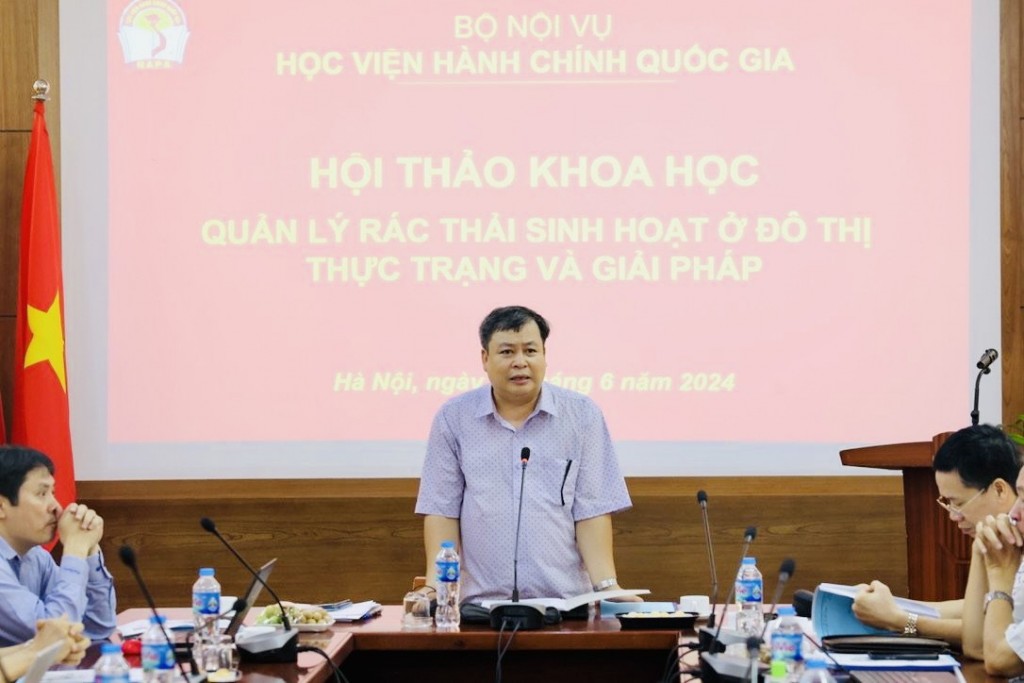
Assoc. Prof. Dr. Dang Khac Anh, Dean of the Faculty of Social Management, delivering opening remarks.
In his opening remarks, Assoc. Prof. Dr. Dang Khac Anh highlighted that, after nearly 40 years of renovation, especially in the past 10 years, urban planning, construction, management, and development in Viet Nam have achieved significant results. By the end of 2020, Viet Nam had 862 urban areas of various types, relatively evenly distributed across the country. Urban spaces have expanded, and technical and socio-economic infrastructure has been increasingly invested in, becoming more synchronized and efficient, gradually improving the quality of life for urban residents.
However, the urbanization process, urban planning, construction, management, and development still face many limitations and lack sustainability. The concentration of populations in highly urbanized areas has led to environmental pollution, including domestic waste pollution.
Currently, Viet Nam discharges about 60,000 tons of waste per day, with 60% being urban domestic waste. The primary method of waste treatment is landfilling, with only about 20% of the waste being hygienically buried. Non-hygienic landfills are causing daily environmental pollution, particularly severe in major cities.
Therefore, to enhance awareness of urban domestic waste management and to contribute to the integration of these issues into policy development and implementation, the training programs of NAPA have included several related topics and courses.
In this context, the workshop was organized to find appropriate orientations and solutions to continue raising awareness and the ability to address the issue of urban domestic waste, gradually improving the quality of urban life in Viet Nam today.
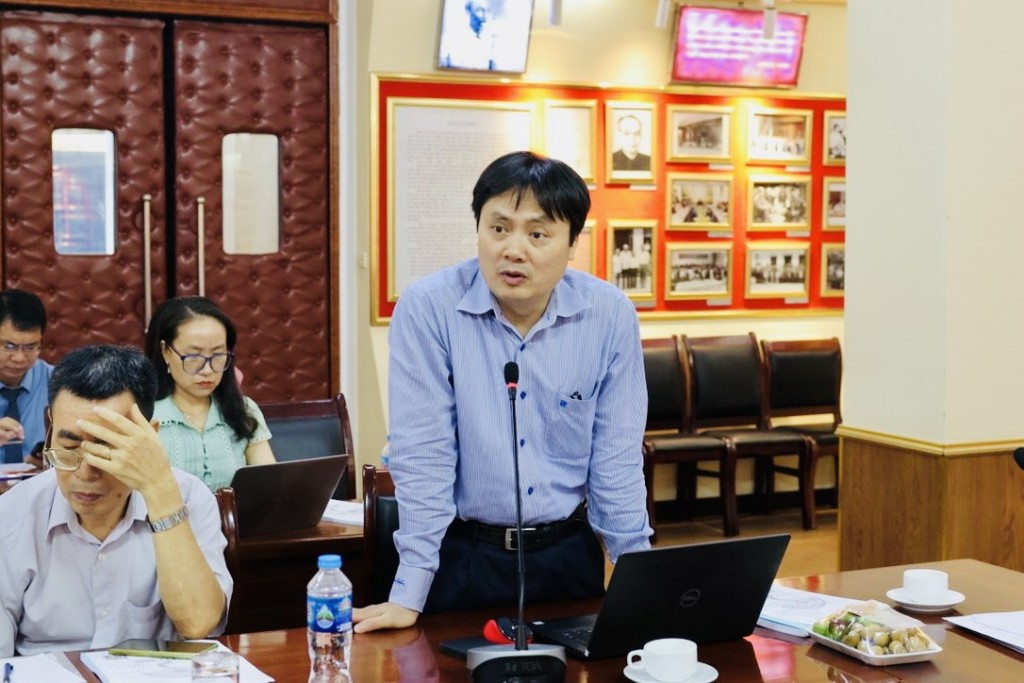
Dr. Nguyen Trung Thang, Deputy Director of the Institute of Strategy and Policy on Natural Resources and Environment, Ministry of Natural Resources and Environment, at the workshop.
In his presentation on “Legal Policies on Domestic Solid Waste Management in Viet Nam,” Dr. Nguyen Trung Thang pointed out that the total amount of solid waste generated daily in 61 out of 63 provinces and cities in Viet Nam is nearly 68,000 tons/day (with about 38,000 tons/day from urban areas and nearly 30,000 tons/day from rural areas). The sorting of domestic solid waste has received attention and has been implemented by various levels and sectors, helping to reduce the amount of waste needing treatment and promoting recycling and resource utilization. Many localities have actively developed programs and projects for implementation.
Despite the numerous directives, policies, laws, and regulations issued by the Party and the State regarding solid waste management, prevention, waste reduction, recycling, reuse, and energy recovery from waste treatment, the effectiveness has not met expectations. There is still a lack of specific mechanisms to incentivize recycling, reuse of waste, and energy recovery from solid waste treatment; there are also insufficient guidelines for policy implementation. Some localities have not issued detailed regulations on the management of household and individual solid waste. Localities are facing difficulties in socializing investment capital for the construction and operation of domestic solid waste treatment facilities.
From the aforementioned challenges and shortcomings in domestic solid waste management, Dr. Nguyen Trung Thang suggested several solutions to improve the legal and policy framework for domestic solid waste management, specifically: (1) Continuing to develop and improve comprehensive mechanisms and policies for the sorting, collection, treatment, and recycling of domestic solid waste; (2) Establishing mechanisms, policies, and management systems to promote the socialization of collection and recycling activities for domestic solid waste; (3) For plastic waste, developing and refining regulations on taxes, fees, and handling of violations related to plastic waste, and researching amendments to the Law.
In his directive speech at the workshop, Dr. Lai Duc Vuong emphasized the role of digital transformation in environmental protection, including the application of modern and high-tech equipment in urban domestic waste management. Digital transformation associated with environmental protection is green transformation aimed at sustainable environmental development. The digital transformation in the collection and treatment of domestic waste is an inevitable trend to save manpower and costs, reduce harm to human health, and upgrade the smart waste management model in urban areas.
According to Dr. Lai Duc Vuong, it is necessary to promote the application of software and the digitization of data in waste management. This is a feasible solution to manage the collection and treatment of urban waste more efficiently and easily. He hoped that the workshop would receive practical contributions through high-practicality sharing and suggestions from environmental protection experts, contributing to the practical experience in teaching and learning for the lecturers, trainees, and students of NAPA in the future.
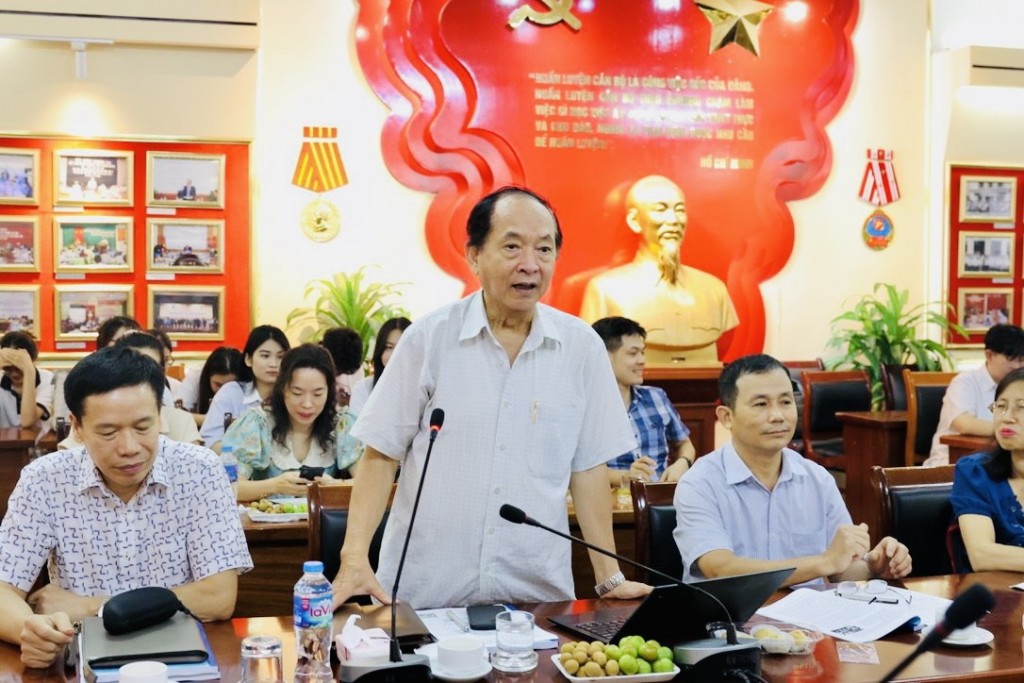
Prof. Dr. Nguyen Huu Dung, Director of the Viet Nam Institute of Urban and Industrial Environment, at the workshop.
Sharing on the topic “Solutions for Sorting, Collecting, Storing, and Transporting Domestic Solid Waste in High-rise Residential Buildings in Urban Areas,” Prof. Dr. Nguyen Huu Dung expressed concerns about the current situation of domestic solid waste collection and treatment in high-rise residential buildings. Assessments of the waste situation nationwide, and in high-rise buildings in particular, have shown an alarming picture of severe pollution in urban living environments and the shortage and degradation of infrastructure in apartment buildings, affecting the health and overall development of society.
Therefore, technical requirements for the waste chute system in high-rise apartment buildings are essential. This system must use advanced technology chutes that ensure fire safety and environmental hygiene. The suitable waste management and collection model is a combination of advanced technical solutions worldwide and social solutions that are community-oriented, fitting the customs and lifestyle of Vietnamese people. The location of the waste chute system must be convenient for residents to dispose of their waste and for sanitation workers to transport it. There must be practical methods for transporting waste that cannot be disposed of via the chute, with the most effective method being the manual collection of bulky, large-volume waste. The general requirements for the waste chute system in high-rise apartment buildings must be suitable for the environmental and climatic conditions, as well as the living habits of Vietnamese residents, combined with advanced global technology, making it convenient for waste disposal and easy waste transportation out of high-rise buildings. The waste chute system in high-rise apartment buildings is a gravity-based waste disposal system used for high-rise buildings, particularly suitable for various types of waste. The waste chute system in high-rise apartment buildings should be suitable for construction both inside and outside. The waste chute system in high-rise apartment buildings can be provided as a complete set.
Based on the comments, Prof. Dr. Nguyen Huu Dung emphasized that sorting, collecting, storing, and transporting domestic solid waste in high-rise residential buildings in urban areas is an essential issue for urban areas, where more buildings are being constructed. Therefore, guidelines for sorting, collecting, storing, and transporting domestic solid waste in high-rise residential buildings in urban areas are crucial, along with solutions for these processes, aiming to contribute to building civilized, green, clean, and beautiful urban areas.
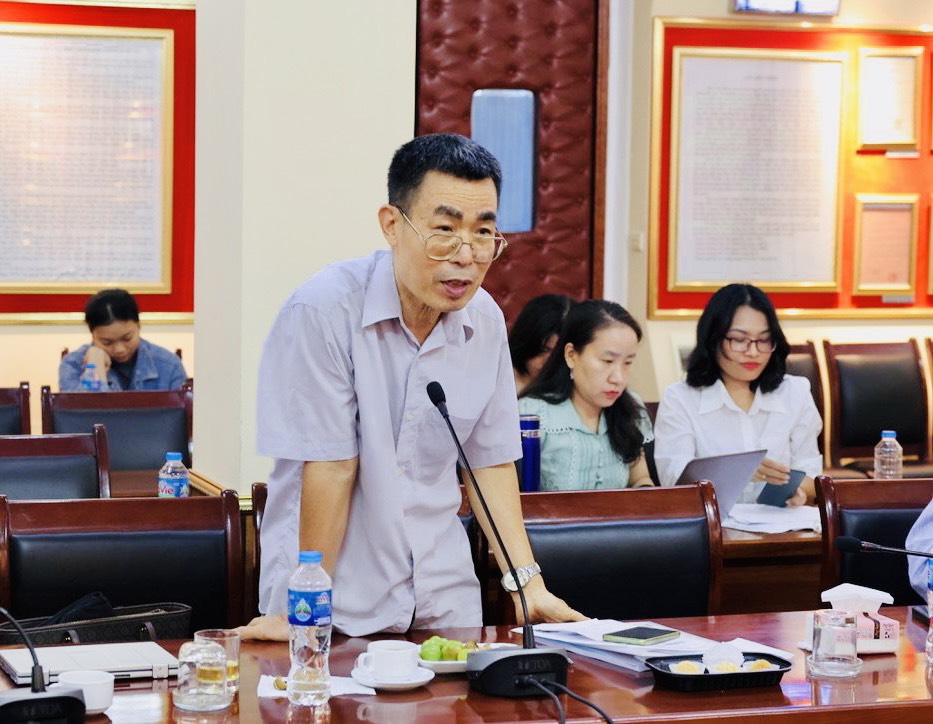
Dr. Hoang Sy Kim, Former Dean of the Faculty of Urban and Rural State Management, NAPA, at the workshop.
In his presentation at the workshop, Dr. Hoang Sy Kim shared some global experiences in urban domestic solid waste management and made recommendations for Viet Nam. The experiences mentioned include: (1) Prevention and Minimization of Waste: This approach helps countries reduce emissions. Waste management becomes simpler when organizations and individuals can reduce waste from the beginning and decrease the hazardous nature of waste by reducing waste containing dangerous substances in manufactured products or consumer choices; (2) Reuse and Recycling: If it is not possible to minimize the use of products that generate waste, it is best to use products that can be reused; (3) Improving and Monitoring Disposal: Non-recyclable waste must be safely incinerated, with landfills used only as a last resort. Both methods need strict supervision as they can seriously harm the environment. (4) Efficient Use of Urban Domestic Solid Waste Treatment Techniques.
Dr. Hoang Sy Kim proposed several solutions, such as enhancing thorough reuse and recycling of waste; incinerating waste to generate electricity; sorting and disposing of waste in designated areas; thoroughly incinerating waste using CFB (circulating fluidized bed combustion) technology; improving the collection system and process for recyclable materials; improving the quality of recycled materials for production.
In the presentation on “Choosing Appropriate Urban Domestic Solid Waste Treatment Technologies in Viet Nam”, Dr Nguyen Viet Dinh discussed several waste treatment technologies currently being applied in urban areas: landfill technology, biological technology for composting, incineration technology, energy recovery incineration, waste-to-energy, and other recycling/reuse technologies for domestic solid waste. However, these technologies are only used in a few urban areas and have not yet achieved large-scale integrated management. They have not comprehensively applied solutions to reduce the proportion of waste that needs to be landfilled (activities aimed at minimizing solid waste generation are among the most important and effective solutions in waste management).
From these technologies and treatment methods, Dr. Nguyen Viet Dinh emphasized that the components of domestic waste can be recycled, leaving only a very small proportion to be landfilled. This would save a significant amount of treatment costs compared to complete landfill disposal or incineration without energy recovery. Recycling waste is not only environmentally significant but also economically beneficial. Recycling waste helps limit the exploitation of natural resources. Recycling can take the form of regeneration, value restoration, or continued utilization of value. Thus, appropriate urban domestic solid waste treatment and recycling technologies can be applied and chosen in Viet Nam. It is necessary to develop a roadmap to implement the transition in management methods, selecting treatment and recycling technologies for domestic solid waste towards sustainable development.
In his concluding remarks, Assoc. Prof. Dr. Dang Khac Anh expressed gratitude for the support and facilitation of the NAPA leaders, which enabled the successful organization of the workshop. Besides nearly 40 papers included in the proceedings, the workshop also featured direct contributions from experts and lecturers on topics such as waste collection and treatment, waste sorting, investment in waste treatment technology and machinery, and communication on waste collection and sorting. These contributions are practical and highly applicable in current domestic solid waste management and collection activities. The workshop organizers will incorporate the feedback and insights from experts and academics into developing a specialized curriculum and related materials for training programs for NAPA students.


